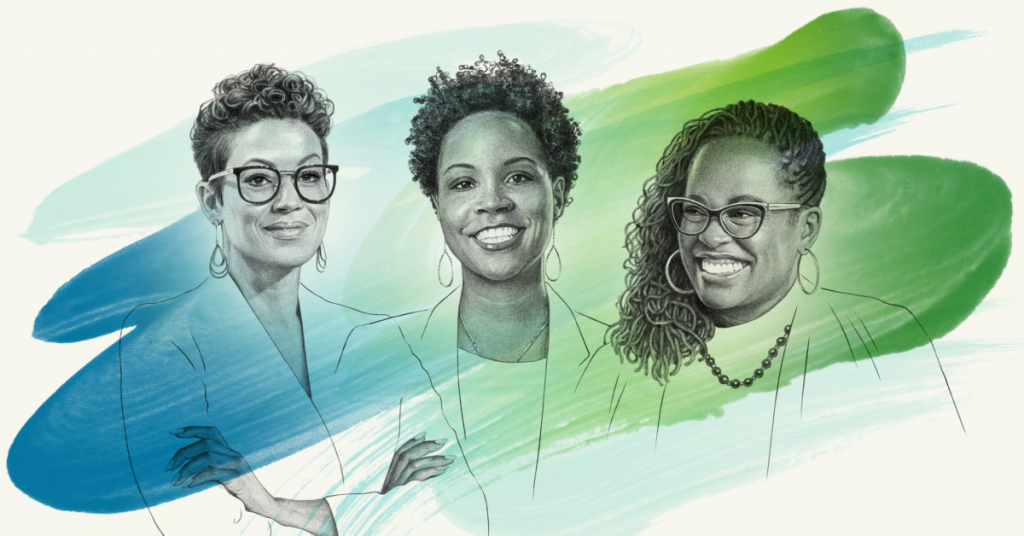
Meet three Black women who are building a more equitable society for all.
A more equitable America is long overdue. The country faces a widespread crisis of inequity across many fronts, from healthcare and wealth to education, impacting citizens of all backgrounds. While these broader socioeconomic challenges impact all underserved communities, Black Americans bear the worst of these issues: As of 2022, the typical Black family held $16 for every $100 possessed by their white counterpart; this wealth disparity is reinforced by the fact that Black workers face higher unemployment rates and lower wages than other Americans.
To address the root causes of inequities, we need leaders with expertise and influence across a variety of sectors and communities to drive change. Enter three nonprofit leaders: New Profit CEO Tulaine Montgomery, Leading on Opportunity Director Sherri Chisolm, and the Black Economic Alliance Foundation CEO Samantha Tweedy. These Black women are helping lay the groundwork for a more equitable country by listening to, and learning from, those who are most proximate to the issues they’re addressing, whether it’s maternal health equity; economic mobility in Charlotte, North Carolina; or wealth-building pathways for Black Americans.
“They’re not nonprofit leaders who are just doing nice things for people,” explains Kwasi Mitchell, the Chief Purpose and DEI Officer at Deloitte, which has invested in these organizations, among many others, as part of its social impact commitments. “These are leaders who are doing great things for people. They would be successful in any environment, but they decided to dedicate their lives to address issues that have been around for years.”
Montgomery, Chisholm, and Tweedy’s organizations each have unique approaches to closing social and economic opportunity gaps but hold in common a commitment to cross-sector collaboration. That approach is shared by Deloitte, which also devotes pro-bono resources to many of the nonprofit organizations it works with, sometimes becoming not only a funder but a collaborator. “For us, it really is about impact and how we work together,” says Dana O’Donovan, Social Impact and Monitor Institute by Deloitte Leader, “because many of the problems we’re trying to solve are far too big for any organization to go after on their own.”
These nonprofit leaders show that it often takes an ecosystem to affect change, with corporations, community organizers, NGOs, and policymakers alike coming together in their shared responsibility to right our society’s wrongs.
Meet the three leaders who are helping lay the groundwork for a fairer country:
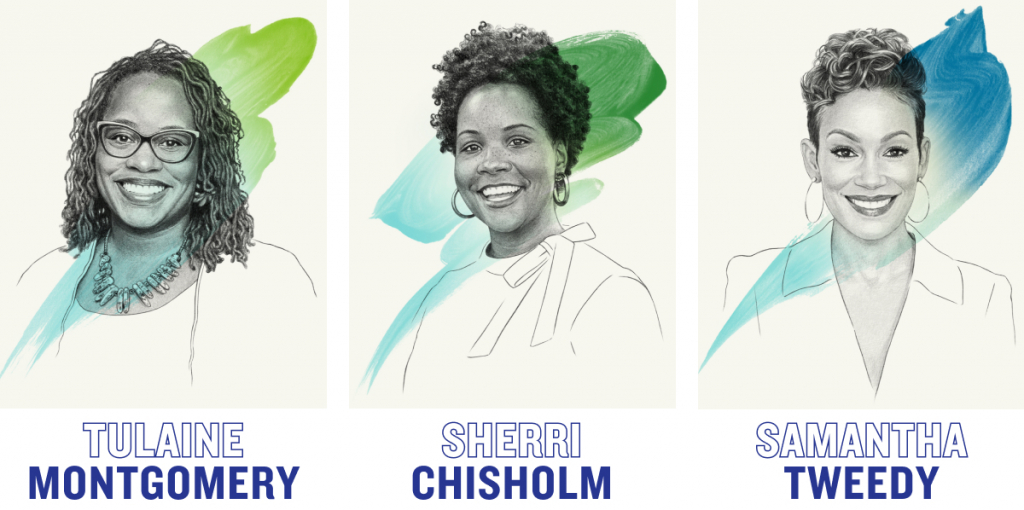
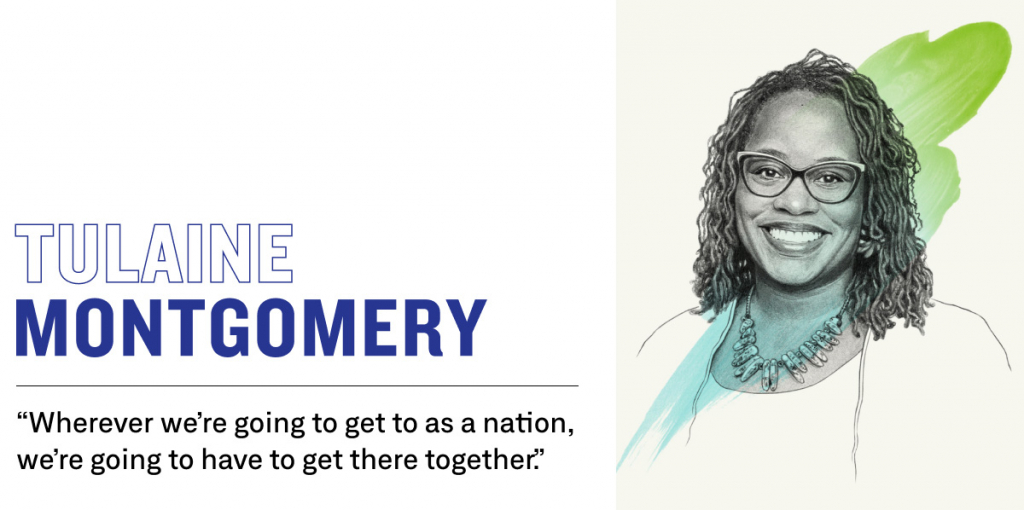
Tulaine Montgomery is a student of history. She knows that to change unjust systems, one must learn from past struggles for equality. When she reflects on major societal shifts, such as the ending of Jim Crow legislation or apartheid in South Africa—moments “when something impossible became reality,” she says—she sees a common thread: No one did it alone. “It’s never been that one marginalized group fought for themselves by themselves, and that’s how change happened,” says Montgomery. “People of different identities, experiences, and even beliefs, came together, anchored around shared values and aspirations.”
Change-makers, as Montgomery sees it, achieve their goals by working in coalition across lines of difference toward a common aim—and social entrepreneurs play a key role in the process. “The assets, aspirations, and capabilities, they completely exist at the community level,” explains Montgomery. The question is then: “What can we do as entrepreneurs to unlock resources and opportunities?”
This ethos inspired Montgomery to become a social entrepreneur herself; in 1996, she was a foster mom to three teenage girls, spending her days “dreaming about how out-of-school time could transform learning outcomes for young people.” In turn, she helped found Citizens Schools, a nonprofit after-school program for middle schoolers. Two years later, she was invited to join 32 leaders from various sectors in designing New Profit, a venture philanthropy organization that supports social entrepreneurs, like herself, who are driving change in their communities.
“A lot of what we dreamed up 27 years ago is what’s in place now,” says Montgomery, who joined the New Profit team full time in 2012 and became sole CEO in 2023. At its core, New Profit still holds the aspiration of a more equal America in every respect—from health and education to economic mobility. To that end, it not only provides unrestricted funding to the social entrepreneurs it backs; it also offers advisory support, evaluative and capacity-building tools, as well as peer communities to ensure its entrepreneurs’ projects reach their full potential. By helping build what New Profit calls MICs™ —multiracial, intergenerational, cross-sector coalitions—Montgomery and her team act as critical connective tissue, bringing together corporate partners, funders, and on-the-ground social entrepreneurs to affect change.
Critically, the social entrepreneurs that New Profit collaborates with are proximate to the communities they serve. These ties lead to deep collaboration with those impacted most by inequality. “Proximate leaders have lived experience, credibility, deep regard, and even deference to their communities and constituents,” explains Montgomery. “You can be of any racial identity and be a proximate leader. Proximate leaders are informed and guided by input and feedback from the communities and constituents they serve.”
Proximate leaders have lived experience, credibility, deep regard, and even deference to their communities and constituents. You can be of any racial identity and be a proximate leader. Proximate leaders are informed and guided by input and feedback from the communities and constituents they serve.
This proximity also leads to novel solutions, as these leaders see, or have experienced themselves, the issues they seek to address. Take Narrative Nation, an organization that’s part of the Health Equity Catalyze Cohort that was created in 2022. The cohort includes early-stage social entrepreneurs who are focused on the root causes of health inequities in the United States. Narrative Nation, led by womens’ and infant health advocate and journalist Kimberly Seals Allers, homes in on the health disparities experienced by America’s Black and Latino communities.
According to the most recent Listening to Mothers national childbearing survey, 21 percent of Black mothers and 19 percent of Hispanic mothers who were hospitalized for childbirth reported perceptions of poor treatment due to their race, ethnicity, cultural background, or language. Narrative Nation seeks to address this gap by hearing directly from those it impacts. Its healthcare review app, Irth—birth minus the B for bias—allows Black and brown patients to share their experiences of maternal healthcare providers with one another. Narrative Nation takes these peer-to-peer reviews a step further by bringing these insights to maternal healthcare providers, who they also consult on how to better serve all patients.
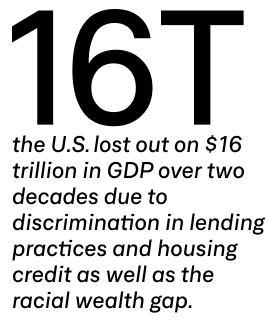
Narrative Nation’s multi-pronged, holistic approach can have an outsize impact, especially with the support of a MIC. A diverse coalition allows each partner, whether it’s a community member or corporation, to contribute meaningfully. “The learning is mutual and reciprocal,” says Montgomery. “We don’t set up dynamics where all the resources sit in the corporate hand, and the role of the entrepreneur is to receive capital.” Rather, the needs of the community in question and the expertise of the social entrepreneur guide the process. For example, in the case of Narrative Nation, New Profit and Deloitte’s support helped the organization coalesce its existing strategy to access more funding and make tactical decisions, allowing its impact on the lives of mothers and children to grow. New Profit’s second Health Equity Catalyze Cohort, which was established in collaboration with Deloitte in 2023, builds upon the work of its first with a specific focus on mental health.
“Tulaine has this ability to galvanize people around a vision of correcting injustices,” says Kwasi Mitchell, the Chief Purpose and DEI Officer at Deloitte. And, on equal measure, she builds trusting relationships with social entrepreneurs by elevating their ideas. “Seeing her be able to inspire and create a place of comfort for the organizations that they invest in, and the leaders in and of themselves, is truly beautiful,” adds Mitchell.
To Montgomery and New Profit, the interdependence inherent to coalition-building isn’t just rhetoric. It’s how necessary change will come. “We really believe in a future where whatever the role you play, you know that you have value, you’re treated with regard, and you have access to opportunity and self-determination, whether you are a person who’s navigating and holding capital or you’re a person who has an innovation and disruption that needs funding,” she says. “Wherever we’re going to get to as a nation, we’re going to have to get there together.”
Learn more at newprofit.org.
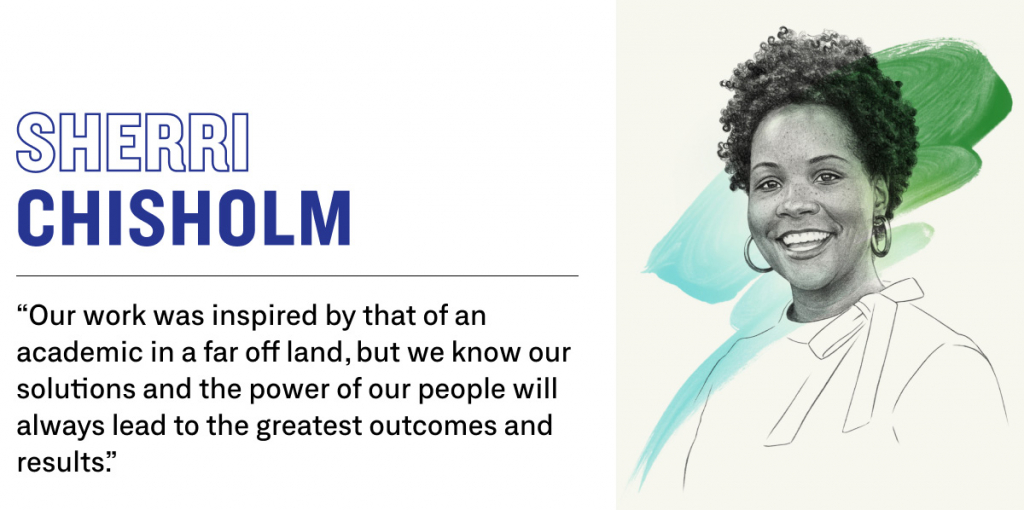
Cherri Chisholm is a product of the Great Migration. A native Detroiter, her grandparents migrated to Michigan from rural northern Alabama in the 1940s in pursuit of “the American Dream”—the promise of economic mobility. Chisholm’s grandfather worked the line at an auto manufacturer; her grandmother was a teacher’s aid. “Generation after generation, my family experienced huge economic benefits as the result of the big risks that my grandparents took,” says Chisholm. “I am where I am today because of them.”
That’s why, when Chisholm became pregnant in 2020, she chose to continue that legacy by making a move of her own: She and her husband relocated to Charlotte, North Carolina, where they could set down roots for their family and “contribute to solving the things that [her grandparents] were running away from.”
Why Charlotte? “It’s a community that is grappling with a less-than-sunshine-y history, but it’s deeply committed to turning things around for all residents,” says Chisholm. Thanks to her friend sharing a newspaper job posting, and her unique skill set (she was a consultant at Deloitte before working in school administration and education reform), Chisholm landed a role at Leading on Opportunity (LOO), a community consultancy focused on creating economic mobility for all residents of the Charlotte-Mecklenburg area.
Economic mobility has been at the forefront of Charlotteans’ minds since the city ranked dead last in a 2014 research study by Harvard economist Raj Chetty, which assessed residents’ ability to rise out of poverty if they were born into it. To put it even more starkly: “If you were born into poverty in Charlotte in the ’80s, the likelihood of you escaping poverty is nearly impossible,” says Chisholm.
Charlotte, despite being a growing city and one of the country’s largest financial centers, is experiencing a “tale of two cities,” as Chisholm explains, where the legacy of segregation, redlining, and eminent domain continue to forestall economic progress for many. “I don’t see how we can talk about the disparities in the economy without talking about the impact slavery had on our community,” says Chisholm. “Charlotte taking that on, to me, is really bold and progressive—to say, as much as we’re moving forward, we’re also looking back to understand how we got to this place and the things we need to undo to see transformational change for the next generation.”
As we are moving forward, we are also looking back to understand how we got to this place and the things we need to undo to see transformational change for the next generation.
The role that LOO fills in Charlotte that of “a community consultant, a catalyst, and a convener.” In practice, that means a lot of coordination and problem-solving, working with funders and nonprofits alike to develop a shared approach based on data. Chisholm is central to that collaborative work. “She’s doing everything from talking to leaders at some of the largest companies in the U.S. all the way down to community-based organizations in order to pull that ecosystem together,” says Kwasi Mitchell, the Chief Purpose and DEI Officer at Deloitte. For example, LOO consults with the Charlotte Executive Leadership Council, which is composed of dozens of CEOs, to help it make collective decisions about how to best contribute to increasing economic mobility. Meanwhile, it partners with coalitions of nonprofits in specific issue areas, like college access, to ensure their strategy and funding has a greater impact.

Data acts as a uniting force in LOO’s collaborations, serving as the basis upon which they arrive at collective decisions. LOO, with support from Deloitte, developed a local measuring tool known as the Opportunity Compass, which tracks progress towards its five determinants of economic mobility: early care and education, college and career readiness, child and family stability, the impact of segregation, and social capital. Its second iteration, Compass 2.0, will analyze the success of nonprofit investments, allowing for collective decision-making guided by material conditions.
While LOO’s work was first inspired by a study conducted “by an academic in a far-off land,” says Chisholm, she notes that Charlotte possesses everything it needs to change its economic trajectory. “We know our solutions and the power of our people will always lead to the greatest outcomes and results,” she says. She hopes other cities will learn from their methodology and write their own collective narratives and ways of measuring progress. “We don’t see it as a zero-sum game,” she says. “We want everyone to be improving. We’re willing and hopeful that others will reach out to us for that.”
For Chisholm, all of this work is a continuation of her grandparents’ legacy, which she wants to carry forward for the next generation of Charlotteans, including her three-year-old daughter. “She’ll have her own burdens to bear,” says Chisholm, “but it’s my hope that the work that I’m doing today will make those burdens lighter, that she’ll be able to live a bold, creative, and liberated life because of a few tweaks I was able to make in my work.”
Learn more at leadingonopportunity.org.
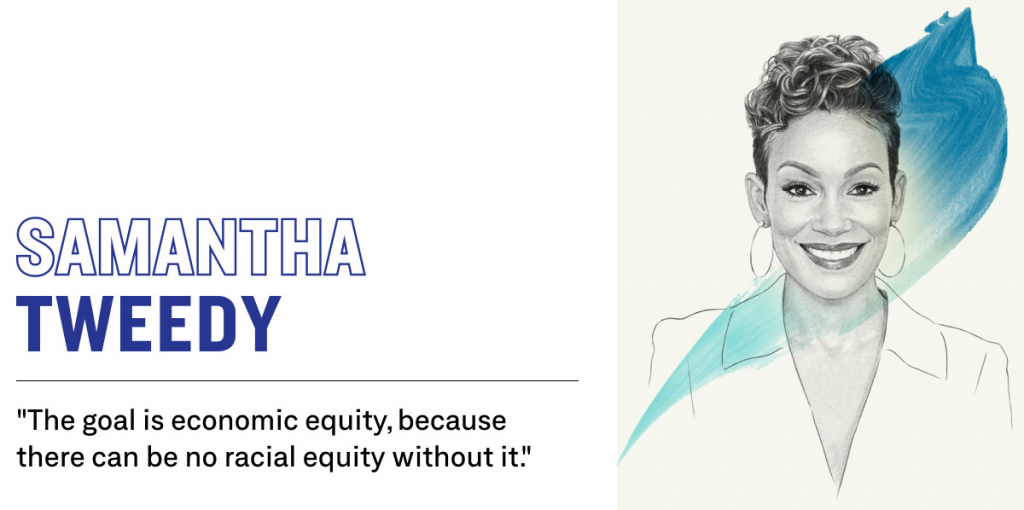
Samantha Tweedy carries forward a legacy of social justice. Her grandfather, at age 20, led sit-ins to end discrimination at a local drug store in Springfield, Illinois, and, nearly two decades later, organized alongside Dr. Martin Luther King Jr. His work with Dr. King brought him to Philadelphia in the 1960s, where he met Tweedy’s grandmother. She worked for the Urban League and went on to raise five children; then, at “the tender age of 40,” she studied law to support Black students in Philadelphia’s public school system.
“This work is in my blood,” says Tweedy, who began her career following in her grandmother’s footsteps: as a lawyer. After working on litigation to close public school spending gaps, Tweedy made education her full focus, and founded a charter elementary school that won a National Blue Ribbon School Award for closing racial and socioeconomic opportunity gaps. She then helped lead Uncommon Schools, a network of charter schools that serve historically disadvantaged students of color; the network’s students go on to graduate from college at a rate up to four-times higher than the national average.
Tweedy wasn’t content with these successes alone; she found herself looking at data and seeing “a disturbing story,” she says. “If the average Black college graduate is earning less than their white counterpart who didn’t finish high school,” she asks, “is education the silver bullet we thought it was?”
In search of an issue area where she could make a systemic impact, Tweedy turned her attention to the racial wealth gap. She points to a sobering statistic: At the time of the Emancipation Proclamation, Black Americans owned less than 1 percent of the country’s wealth. Today, they own less than 3 percent. “Despite hundreds of years of work—from Reconstruction to the Civil Rights Movement to the most recent [racial] reckoning—we have not yet seen the progress we need,” says Tweedy.
Despite hundreds of years of work—from Reconstruction to the Civil Rights Movement to the most recent [racial] reckoning—we have not yet seen the progress we need.
As CEO of the Black Economic Alliance (BEA) Foundation, Tweedy focuses on work, wages, and wealth. The organization brings together the collective knowledge of Black business leaders to drive change in these issue areas for Black Americans. Tweedy notes that “there is a misguided belief that our economy is a limited pie, and for someone to get a bigger piece, someone else’s piece has to get smaller.” In reality, research shows that the economy benefits when Black Americans have access to economic opportunity: research done in 2020 indicated that the U.S. lost out on $16 trillion in GDP over two decades due to discrimination in lending practices and housing credit as well as the racial wealth gap. “The data made it clear to Tweedy: investing in Black prosperity grows the entire economy, just as investing in creating a diverse team grows profitability at a company,” says Tweedy.
Their BEA Foundation’s unique lens enables them to address a range of structures that can block progress for Black Americans, from affordable housing and workforce development to voting rights and tax relief. One avenue for this work is policy change. The BEA Foundation recently released its Policy Agenda to Advance Black Work, Wages, and Wealth, which puts forward wealth-building solutions to policymakers. Its recommendations are informed by a survey the Foundation conducted on Black Americans’ views of economic success—thereby centering the experiences of those impacted by policies in the process of rewriting them.

Meanwhile, the BEA Foundation is expanding its community by fostering the growth of young Black Entrepreneurs. It works with HBCUs through its Center for Black Entrepreneurship, which aims to ensure aspiring Black entrepreneurs they have access to support, mentorship, and capital they need to succeed. The success of these entrepreneurs can further the BEA Foundation’s aims of wealth building for Black Americans and the economy more broadly, “What I love about the BEA is not only the work, wages, and wealth perspective they focus on, but recognizing that if we go along that journey, we could also do similar things for Hispanic and Latinx citizens across the US, and think about other populations as well to drive socioeconomic equity,” says Mitchell.
Tweedy is a powerful force for change behind the BEA Foundation, in great part because of her clear perspective on how to achieve a better future for Black Americans. “She’s somebody with not just intellect and charisma,” says Mitchell, “but a strong vision of, ‘We’re going to kick down every door, and I’m going to bring a group of people along, so that we can address things that have been problematic for centuries.’” Tweedy, characteristically, states her aim plainly—and her work won’t be over until it’s achieved. “The goal is economic equity, because there can be no racial equity without it,” she says. “We need to get to a place in this country where Black wealth is the norm, no longer the exception.”
Learn more at blackeconomicalliance.org.


